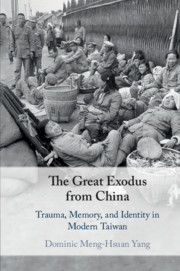Book contents
- The Great Exodus from China
- The Great Exodus from China
- Copyright page
- Dedication
- Contents
- Figures, Maps and Tables
- Acknowledgments
- Note to the Reader
- Abbreviations
- Maps
- Introduction
- 1 The Exodus
- 2 Wartime Sojourning
- 3 Cultural Nostalgia
- 4 The Long Road Home
- 5 Narrating the Exodus
- Epilogue
- Bibliography
- Index
2 - Wartime Sojourning
Published online by Cambridge University Press: 12 September 2020
- The Great Exodus from China
- The Great Exodus from China
- Copyright page
- Dedication
- Contents
- Figures, Maps and Tables
- Acknowledgments
- Note to the Reader
- Abbreviations
- Maps
- Introduction
- 1 The Exodus
- 2 Wartime Sojourning
- 3 Cultural Nostalgia
- 4 The Long Road Home
- 5 Narrating the Exodus
- Epilogue
- Bibliography
- Index
Summary
Throughout the 1950s, most mainlanders thought their stay in Taiwan would only be temporary. According to their shared recollections today, Chiang Kai-shek’s vow to retake China was the main reason for this wishful thinking. Based on the study of major newspapers and magazines published in 1950s Taiwan, this chapter identifies a different source for this unwarranted optimism. It argues that the mainlanders’ “sojourner mentality” should be understood in the longue durée of war/displacement that straddled the temporal boundary of 1949 and the geographical boundary of the Taiwan Strait. Many of the expellees had previously been refugees during Japan’s invasion of China. In 1950s Taiwan, their earlier displacement became a major source of consolation, inspiration, and optimism. This “sojourner mentality” and memory production was therapeutic. But it nevertheless contributed to the mainlanders’ “unholy alliance” with the authoritarian Nationalist regime and their continued estrangement from the local Taiwanese population, whom they looked down upon as “coachable compatriots.” The chapter ends with the shock of the Sino-American Joint Communiqué in 1958 during the Second Taiwan Strait Crisis. The event greatly reduced the mainlanders’ hope of return. It shifted the focus of their memory production from earlier wartime displacement to provincial native places.
Keywords
- Type
- Chapter
- Information
- The Great Exodus from ChinaTrauma, Memory, and Identity in Modern Taiwan, pp. 86 - 126Publisher: Cambridge University PressPrint publication year: 2020

